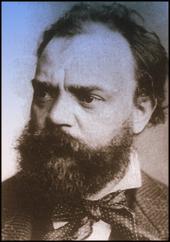Dvorak was born in Nelahozeves near Prague (today the Czech Republic) where he spent most of his life. He studied music in Prague's only Organ School at the end of the 1850s, and slowly developed himself as an accomplished violinist and violist. Throughout the 1860s he played viola in the Bohemian Provisional Theater Orchestra. The need to supplement his income by teaching left Dvorák with limited free time, and in 1871 he gave up the orchestra in order to compose. He fell in love with one of his pupils and wrote a song cycle, Cypress Trees, expressing his anguish at her marriage to another man. However, he soon overcame his despondency and in 1873 married her sister, Anna Cermakova.
From 1892 to 1895, Dvorák was the director of the National Conservatory in New York City. The Conservatory was founded by a wealthy socialite, Jeannette Thurber, who wanted a well-known composer as director in order to lend prestige to her institution. She wrote to Dvorák, asking him to accept the position, and he agreed, providing that she were willing to meet his conditions: that talented Native American and African-American students, who could not afford the tuition, must be admitted for freean early example of need-based financial aid. She agreed to his conditions, and he sailed to America.
It was during this time as director of the Conservatory that Dvorák formed a friendship with Harry Burleigh, who became an important African-American composer. Dvorák taught Burleigh composition, and in return, Burleigh spent hours on end singing traditional American Spirituals to Dvorák. Burleigh went on to compose settings of these Spirituals which compare favorably with European classical composition.
In the winter and spring of 1893, while in New York, he wrote his most popular work, the Symphony No.9 "From the New World". Following an invitation from his family, he spent the summer of 1893 in the Czech speaking community of Spillville, Iowa. While there he composed two of his most famous chamber works, the Quartet in F ("The American"), and the String Quintet in E flat.
Also while in the United States he heard a performance of a cello concerto by the composer Victor Herbert. He was so excited by the possibilities of the cello and orchestra combination displayed in this concerto that he wrote a cello concerto of his own, the Cello Concerto in B minor (1895). Since then the concerto, considered one of the greatest of the genre, has grown in popularity and frequently performed today. He also left an unfinished work, the Cello Concerto in A major (1865), which was completed and orchestrated by the German composer Günter Raphael between 1925 and 1929 and by Jarmil Burghauser in 1952.
Dvorák was a colorful personality. In addition to music, there were two particular passions in his life: locomotive engines, and the breeding of pigeons.
He eventually returned to Prague where he was director of the conservatory from 1901 until his death in 1904. At the end of his life Dvorak was in serious financial straits, as he had sold his many compositions for so little he had hardly anything to live on. He is interred in the Vyehrad cemetery in Prague.
